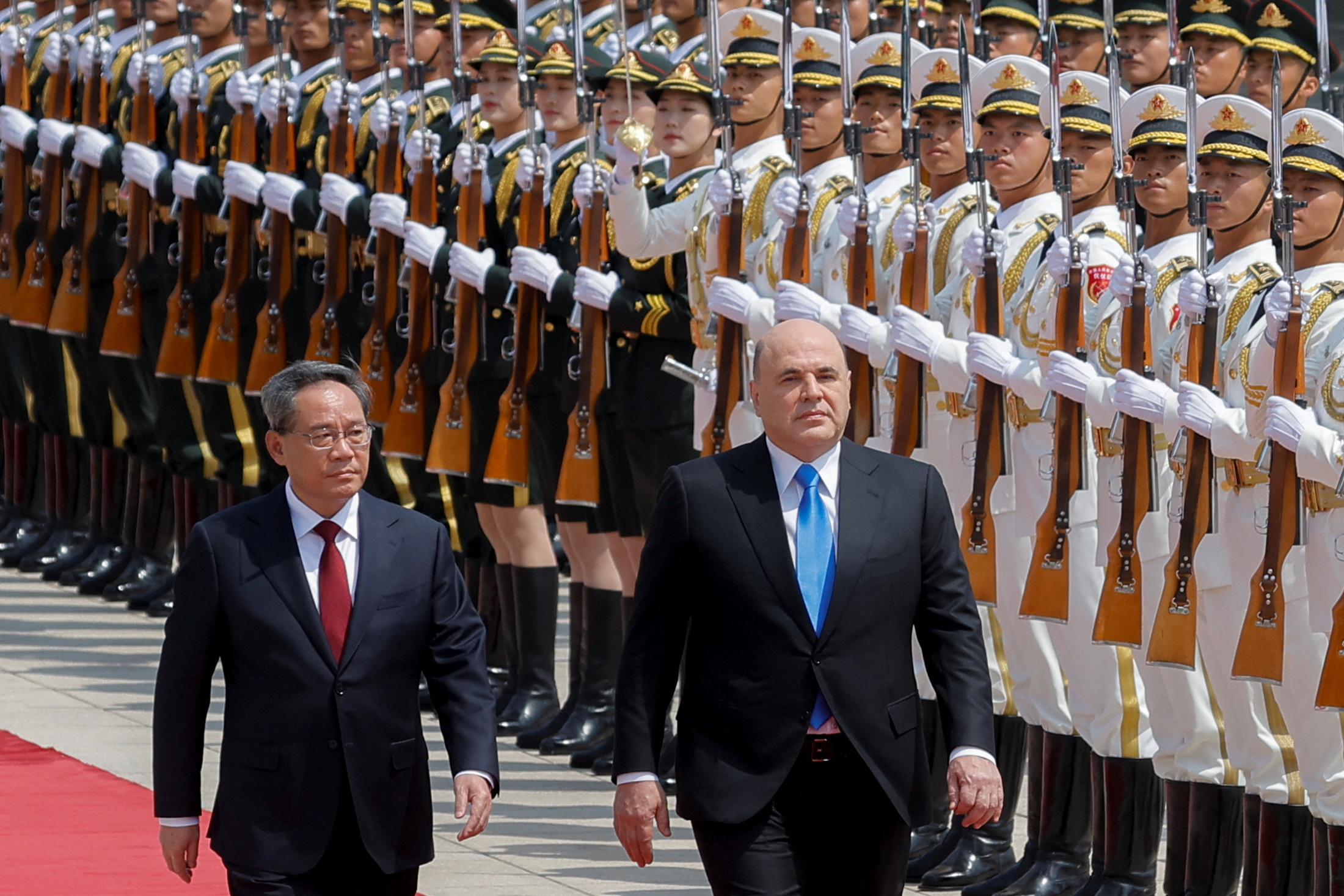
Chris Lange, FISM News
[elfsight_social_share_buttons id=”1″]
Russian Prime Minister Mikhail Mishustin signed memorandums of understanding with Chinese Premier Li Qiang on Wednesday in Beijing to expand trade between the two countries and the export of Russian agricultural products to China.
“Today, relations between Russia and China are at an unprecedented high level,” Mishustin told Li in their televised meeting.
“They are characterized by mutual respect of each other’s interests, the desire to jointly respond to challenges, which is associated with increased turbulence in the international arena and the pattern of sensational pressure from the collective West,” he said.
Li responded that “China is willing to work with Russia to implement the joint cooperation between the two countries, and promoting pragmatic cooperation in various fields can take it to a new level.”
The announcement came just days after Group of Seven (G7) members wrapped up a three-day summit in Japan where they imposed fresh sanctions against Russia. The leaders representing the world’s richest democracies also took aim at China’s “economic coercion” with warnings against helping Moscow skirt the punishments. G7 members declared that they would reduce exposure to the world’s second-largest economy in everything from computer chips to minerals. At the same time, the leaders said pragmatically that there is no desire among them to “thwart China‘s economic progress and development.”
Steve Tsang, director of The School of Oriental and African Studies China Institute in London, said that the expansion of the “no limits partnership” between the two countries should come as no surprise.
“With sanctions against Russia providing new opportunities for China, it is hardly surprising that China would be happy to engage actively, if not proactively with Russia economically, as long as whatever relationships they forge will not trigger secondary sanctions against China,” he said.
“China’s policy towards the war in Ukraine is one of “declaring neutrality, supporting Putin and paying no price”, and the visit reaffirms it,” Tsang added.
Beijing maintains that its economic ties to Russia have nothing to do with Ukraine.
RUSSIA DECLARES VICTORY, END TO TWO-DAY INCURSION
Russia’s military announced on Tuesday that it forced armed militants who attacked the border city of Belgorod back into Ukraine, killing more than 70 “Ukrainian nationalists” in the process.
Russia’s Ministry of Defense said that its forces defeated enemy fighters with “air strikes, artillery fire and active action by border units” following the Monday raid that signified the largest incursion within Russia’s borders to date in the war now grinding into its 16th month.
“The remnants of the nationalists were pushed back to Ukrainian territory, where they continued to be hit by gunfire until they were completely eliminated,” the ministry added.
Hours after the announcement was made, Belgorod regional Governor Vyacheslav Gladkov said on the Telegram messaging app that a drone had dropped an explosive device in the area.
The post included an image of a damaged car, per Reuters. Gladkov added that another drone was shot down by anti-aircraft fire.
Two Russian anti-Kremlin groups based in Ukraine separately claimed responsibility for the two-day attack.
The Freedom of Russia Legion claimed that it had “demilitarized” a Russian motorized rifle company and destroyed armored vehicles in a social media post, per the report.
“…Putin’s forces have not distinguished themselves with any successes in the past day,” the group said in the post. “…While they cowardly hide in the bushes, we will move forward to our goal — the complete liberation of Russia!”
The Russian Volunteer Corps (RVC), meanwhile, declared: “One day we’ll come to stay,” adding that none of its fighters had been injured. Gladkov said on Monday that one civilian was killed and two were wounded during an emergency evacuation Monday.
Despite the groups’ respective claims, Russia blamed the attack on Ukraine. Kyiv officials said on Wednesday that they were monitoring the situation but reiterated that Ukraine had “nothing to do” with the raid.
Former Russian President Dmitry Medvedev, who now serves as deputy chairman of Russia’s Security Council, called Ukraine’s denials “lies” and said that the attackers should be exterminated “like rats.”
BLACK SEA GRAIN DEAL REMAINS UNDER THREAT WITH NEW ACCUSATIONS OF NONCOMPLIANCE
Kyiv and Moscow on Tuesday blamed one another for violating the Black Sea grain export deal in what has become a common occurrence.
Ukraine said that Russia had essentially cut off the port of Pivdennyi on the banks of the Ajalyk estuary in the northwest coast of the Black Sea. At the same time, Russia claimed that it had been blocked from exporting ammonia through a pipeline to Pivdennyi.
The United Nations, which helped broker the pact, voiced concern on Monday that the port had not received any ships since May 2.
Ukrainian Deputy Renovation Minister Yuriy Vaskov said that since April 29, Russian inspectors have refused to inspect ships bound for Pivdennyi in “gross violation” of the agreement. Under the pact, cargo vessels are to be inspected by a joint team of inspectors from Ukraine, Russia, Turkey, and the U.N.
“They (Russia) have now found an effective way to significantly reduce (Ukrainian) grain exports by excluding the port of Pivdennyi, which handles large tonnage vessels, from the initiative,” Vaskov said in written comments on Tuesday.
The SE Pivdennyi Sea Trade Port processed 3.2 million tons of cargo in 2022, according to Ukrainian Shipping Magazine.
The Black Sea deal entered into last July has been under continuous strain, in large part due to numerous complaints by Russian officials accompanied by threats to pull out of the pact. The U.N. pushed for the deal to guarantee the safe export of agricultural products to developing countries in an effort to avert a global food crisis.
